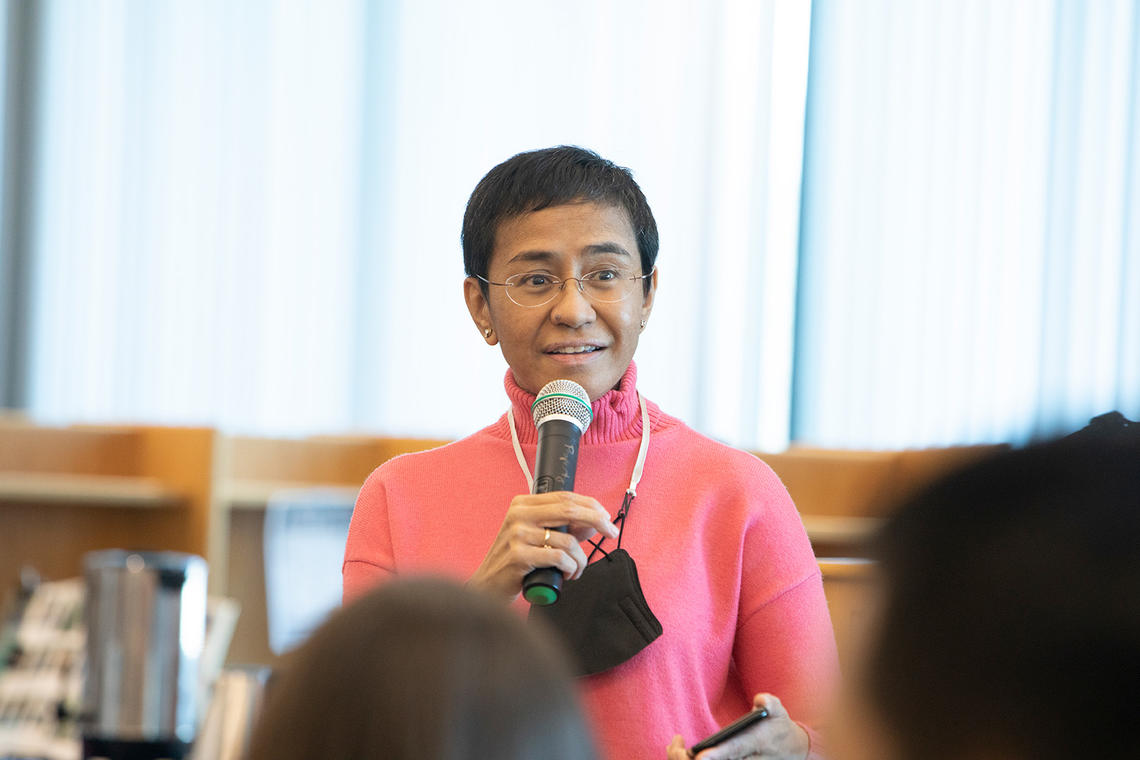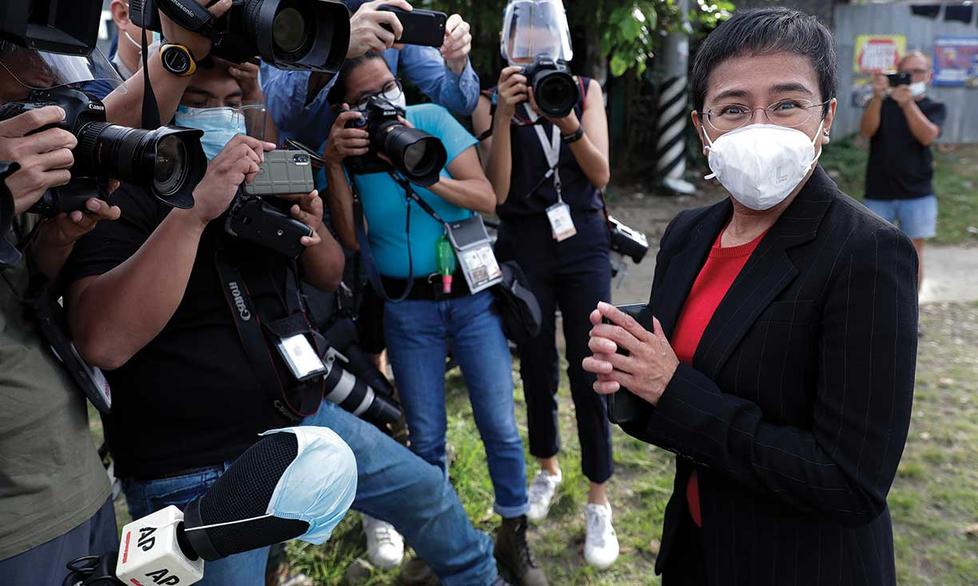Prison Could Be Imminent for Nobel Peace Prize Winner Maria Ressa ’86
Activists sound alarm as her case likely heads to Philippines Supreme Court

The legal battle between Maria Ressa ’86 and the Philippine government has reached a critical point. The Nobel Peace Prize winner will soon know whether she can continue to live as a free citizen, or if she will be sent to prison for her work as a journalist.
Since 2018, the government has brought 23 cases against Ressa and Rappler, the news organization she leads in Manila, and she is currently in the midst of defending seven cases on charges of cyber libel and tax evasion.
In the most pressing of the seven, a Filipino-Chinese businessman has alleged cyber libel for a 2012 article connecting him to illegal activities such as human trafficking and drug smuggling. The article was posted a few months before passage of the country’s Cybercrime Prevention Act of 2012, and the complainant filed his lawsuit five years after the article was published, alleging it had been updated in 2014 and he was not given a chance to comment and refute the allegations. Rappler said the update was made only to correct typographical errors.
Ressa and her former researcher were found guilty in that case in June, and appeals in lower courts have so far been unsuccessful. Her legal team had until Nov. 24 to file an appeal to the country’s Supreme Court, and if the conviction is upheld, she faces up to six years and eight months in prison. The Committee to Protect Journalists (CPJ) reports that if she is convicted in all of the cases that have been brought, Ressa could be sentenced to nearly 100 years in prison.
Ressa spoke with PAW but did not want to comment about the specifics of her case during this sensitive period. However, other parties around the world are encouraging action on Ressa’s behalf, including the CPJ, the International Center for Journalists, Reporters Without Borders, and the #HoldTheLine Coalition of more than 80 groups around the world.
One activist with ties to Princeton is Kathy Kiely ’77, a member of the University’s Board of Trustees and the Lee Hills Chair in Free-Press Studies at the Missouri School of Journalism, who launched a Substack in October called Princetonians for Maria. In her inaugural post, she encouraged Princetonians to contact their elected officials: “Ask your senators and your representative in the House to contact the Philippine ambassador in Washington, Jose Manuel Romualdez. Letting him know that U.S. legislators are concerned about this case and watching it could have an important impact.”
The Philippines has become an increasingly hostile environment for journalists in recent years as the government cracks down on any reporting perceived to be too critical of leadership. Rappler has been the target of political harassment and intimidation and has been forced to devote about a third of its operating expenses toward legal fees. Three journalists and media workers have been murdered in the Philippines in 2022 alone.
Ressa was awarded the Nobel Peace Prize in 2021 for her reporting on the authoritarian administration of Philippine President Rodrigo Duterte. The Nobel committee called Ressa and co-winner Dmitry Muratov, a journalist in Russia, “representatives of all journalists who stand up for this ideal in a world in which democracy and freedom of the press face increasingly adverse conditions.”
For now, Ressa remains free from prison and has been given permission to travel in recent weeks. She has left the country dozens of times in the past few years, but she has always returned home and has committed to continue doing so.
She made a stop at Princeton in November to celebrate Theatre Intime’s 100th anniversary, and she plans to travel for her book tour. How to Stand Up to a Dictator went on sale Nov. 29. The book is part memoir and part democracy manifesto, in which Ressa encourages readers to recognize democracy’s fragility and not take it for granted.
“You don’t know who you are until you’re forced to fight for it,” Ressa told PAW. “When that happens, the strongest pressure creates the diamond, right? Forged under pressure. And I think that’s what’s happened to us in Rappler.”












2 Responses
Winston Riley
6 Months AgoRessa Champions Truth
Noam Chomsky faced less severe punishment, although he was targeted by the U.S. government more than once for his outspoken activities protesting the Vietnam War. And of course, Noam (until his stroke more than a year ago) has remained vigilant, exposing the truth about politics and business. Maria Ressa is a hero and a champion of truth. We are all so lucky to have activists and writers such as Noam and Maria. Hats off and Godspeed.
Suran Song
2 Years AgoWhat Ressa Is Facing
Maria Ressa is facing 100 years in prison in the Philippines. The caption beneath the lead photo is so dismissive. It greatly downplays the threat Ms. Ressa faces, even to the point where it might dissuade readers from taking up a pen to write to Congress in her behalf.